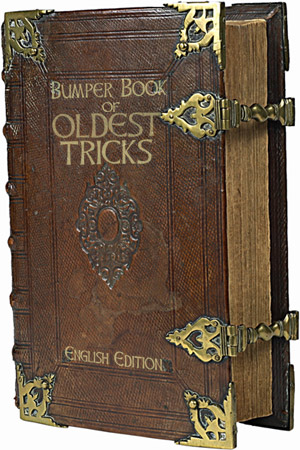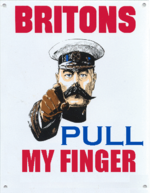The Oldest Trick in the Book
The Oldest Trick in the Book is the infamous "Tapping on a person's left shoulder when you're standing on their right". This trick was first chronicled in cuneiform by the Ancient Sumerians. This chronicalisation also created "The Book" itself. In this article, we will chronologically summarise, from oldest to newest, the tricks in The Book.
Ancient Tricks
The Shoulder Tap
In the year 10580 B.C.E. the Babylonian king, Hammurabi, reigned supreme over the Mesopotamian deserts. On February 30, during a long speech by Irhemhotep, he stood on Shamadad's right, and reached over and tapped him on the left shoulder. As a result, Shamadad looked to his left, where no one was standing. All would laugh, as decreed by law, or else be condemned to read Oscar Wilde quotes everywhere. Immensely proud of his ingenuity, Hammurabi ordered these endeavours to be recorded in cuneiform on a clay tablet. This tablet was the first page in a small 'tricks' archive, which would later become 'The Book'.
Alternative Shoulder Tap
Years later, the minor prophet Zarathustra, experimenting with various tricks, attempted what was previously unheard of: the other side. Standing on the left this time, and tapping the person's right shoulder was, until that time, never considered, and almost heretical. It worked with stupendous results, even on people who have been so duped many times before.
The Cheque is in the Mail
Around 9000 B.C on the island continent Atlantis, the lazy, shiftless and shady dealing Atlanteans came up with the third oldest trick in the book (then known as the 'Youngest Trick in The Book'); "The Cheque is in the Mail". Many Atlanteans did not like paying bills and often spent most of their pay cheques on beer and kittens. To get landlords, creditors, and deities (see Zeus the Moose) off their backs, they would tell the creditor "The check is in the mail!". This would confuse creditors, who would return home and sit by the letterbox for the rest of the afternoon, while the Atlanteans would duck out for another beer. The most famous usage of this trick was when the Atlanteans used it to stop paying for the running costs of the city water pumps they bought from D-bay, designed to keep out the ever-rising floodwaters common to the Indian Ocean region. This resulted in the Great Flooding of Atlantis, which became so severe that the island eventually became submerged under the ocean. It is now only frequented by mermaids and lost Japanese midget submarines. In America, this trick is referred to as "The Check is in the Mail."
There's Something on Your Shirt
5000 B.C: In Ægyptüs' Old Kingdom, the Pharaoh, Menes (who wasn't really a meanie, he just had an odd sense of humour), enjoyed a good laugh. One of his favourite tricks (and the fourth oldest trick) was to tell a person "You've spilled wine on your tunic!". When the victim looked down, Menes would flick them on the nose. At the time, this was not an "old gag".
He Went That-A-Way
3500 B.C: During the Chinese Dang Dynasty, Mongol invasions were a big problem. The hordes would come down, ask where the Emperor was and then demand ransom from his kingdom for him. Finally, an aide to the Emperor known as Yu Tso Dum pointed the opposite direction that the Emperor had actually gone and led the hordes to Europe, where their search inadvertently split the Roman Empire into two halves.
Ahomosezwut
2500 B.C: Socrates (pronounced "SOCK-RA-TEES") was a renowned philosopher but little known practical joker. Not many in the gag community are aware that he was the originator of the infamous "Ahomosezwut" gag. When a rival philosopher or particularly adept student pointed out an error in his reasoning, Socrates would rapidly counter with "Ahomosezwut" ("a homo says what"). The rival, unable to understand, would ask "What?" Socrates would then say "Exactly." This evolved into other comebacks like: I bet I can make you say how, (lame) Alamepersonsezwhut, (lamer) and the worst of all, Yourafaghusezwhut.
Alternatives
Later alternatives, also thought up by Socrates include:
- "Afagsezno" - to be used in the context of "Did you see that new Arabian fighter at the circus, Afagsezno?"
- "Ahomosezpardon" - to be used on very polite people.
Ding Dong Dash
2000 B.C.: The Israelites, under King Solomon, were constantly at war with their neighbours, the Philistines. Solomon was wise; but he was also a wise guy (nyuk nyuk nyuk). Solomon enjoyed making the Philistines look stupid. The Philistines had a bell attached near the flap of their tents. According to their religion, Baal would ring the bell, and anyone who came out to greet him would be blessed with good fortune. Solomon enjoyed sneaking into the Philistines' camp, ringing the Baal bell and running away. The Philistines, expecting to find Baal, found no one.
Red Hot Flush
1500 B.C.: The Harappan civilization of the Indus valley were among the first to have sewer systems, and even running water and indoor flush toilets. The Harappans were the first to practice the Indian bathing ritual, but they also developed the next prank on the list. Archaeologists have discovered that in houses with older and younger siblings, often when the older sibling was taking a shower, preparing for the courtship ritual, the younger sibling would sneak into the bathroom and flush the toilet. The rapid loss of cold-water pressure would force only hot water into the shower, resulting in a blast of hot water instead of the carefully regulated warm water.
Your Shoelace is Untied
In 50 BC the glory of the Ancient Roman republic was in full flower. However, one man grew ambitious and that man was Julius Caesar. Caesar would become the first dictator of Rome (Thus named because he was also a dick). One of his favourite pranks while in the Senate was to inform Cassius his sandals were unlaced. Cassius (ignorant of the fact that sandals did not, in fact, have laces, and that laces were yet to be invented) would bend over and attempt to re-tie them; this invariably caused his toga to separate, exposing his undergarment. It was then that Caesar would strike: he would grab Cassius' undergarment and pull up sharply, causing the garment to be wedged between Cassius' buttocks. Cassius would yelp in surprise and pain, while Caesar would laugh until he cried. Caesar would eventually receive his comeuppance in an April Fools prank played sixteen days too early.
Have you the right time?
48 B.C.: Another gem from Ancient Rome involves this now famous gag. The preceding decade had seen the emergence of a fashion of the "wrist sundial" particularly amongst Egyptian tourists. Young Roman Comedians would approach individuals within the cities taverns and ask "Have you the right time?". The person questioned, who would be holding their drinking gourd or flagon would tilt their arm to view their sundial, pouring their wine down the front of their toga, to the hilarity of the watching crowd.
Middle Ages and Renaissance
Burning Bag of Dog poo
435 A.D. In this year, Rome fell with a loud crash. Vandals, pushed out of their homeland by Huns, swept into the Roman Empire, and eventually into Rome herself. The Vandals brought with them a number of brilliant pranks, including TP-ing, super glue on the door handles, and outhouse tipping.
Their most famous prank, and the one which caused the Romans the most consternation, was the burning bag of dog feces. The prank was similar to the Israelites' Ding Dong Dash, but with an added twist. Before the escapade, the Vandals would collect dog poo in a paper bag. The pranksters would then sneak onto the porch of a Roman villa, light the paper bag, put the burning bag on the doorstep, ring the bell, and hide. When the master of the house opened the door, he would see no visitor, only a small fire! Having no ready fire-fighting equipment, the victim would attempt to stomp the fire out; this would only get dog poo all over the bottoms of the victim's sandals, creating a disgusting, foul-smelling mess. The Vandals found this to be hilarious.
Turning Off the Lights and Pretending You're Not Home
1066 A.D.: After the Battle of Hastings, William the Conqueror led his Norman armies throughout Britain, conquering (hence, his last name). Many Saxons actually welcomed the Normans, shouting "Norm!" whenever the Normans rode up. (In fact none of the Normans were called Norm, except one - and man did it bother him, because he'd look up every time.) Other Saxons were not so enthusiastic.
Ivanhoe (so named because his Dad was named Ivan, and his Mum was an actress) for example resisted; his resistance was due to the heavy taxes the Normans placed on the Saxons. Ivanhoe's method of resistance was unique for its time. Rather than just kill the Tax Collector and steal the taxes, Ivanhoe went for a more peaceful approach. Whenever the tax collector rode up, Ivanhoe would extinguish all of the torches, and blow out all of the candles in his castle. He would then hide behind the curtains, and order all of his servants and family members to do the same, making it appear to the tax collector that no one was home.
The Delbert
1193 A.D.: The Crusades were a long and difficult struggle. European knights travelled thousands of miles from their homes to reach the Holy Land.
After long difficult fighting over the holy city Jerusalem, King Richard the Lionheart decided that enough was enough. He received reports that his nephew Prince John was persecuting Robin Hood, and decided to head for home. Before he and his knights left for the long drive back to England, Richard, who also had the lion's bladder, extolled everyone to pee before the group left Jerusalem. His brother-in-law, Delbert, reported that he didn't have to go just then. Richard warned that he was not stopping along the way.
When the group reached a 7-Eleven in Tyre, Delbert requested a pit stop. Richard was very angry at this delay, but stopped anyway. Delbert was the only one who had to go, and since no one liked Delbert, the knights decided to drive off while Delbert was still inside peeing. This is the origin for the practice of leaving the least popular party member behind at a pit stop. To this day, some scholars still refer to the practice as "Delberting".
Spyglass Shiner
1538 A.D. The astronomer Copernicus spent hours gazing at the stars through his telescope, often leaving it only to eat and sleep. His understudy, Galileo, saw this as a great opportunity for humour. On a day when Copernicus was expecting a visit from his patron, Galileo coated the eyepiece with burnt coal. Copernicus wanted to get another quick gaze in before his patron came. When the nobleman finally arrived, Copernicus greeted him, with a coal-blackened eye. It wasn't until his patron was already gone that Copernicus discovered Galileo's mischievous act.
The Hot Foot
1610 A.D. During the infamous Spanish Inquisition, the grand inquisitors often used torture and cruelty to gain confessions for sins, be they real or imagined. One inquisitor, Xavier Fuego, believed that surprise and pain could be combined to speed the confession process. While the victim was sitting at a table being questioned, Fuego would sneak under the table and place small splinters of wood between the victim's toes. While the victim was distracted by the questions of Fuego's accomplice, Fuego would light the splinters. Eventually the splinters would burn down to the skin. The victim would scream in shock and pain, and Fuego's accomplice would exclaim, "The Devil is burning your feet because you are lying!" When the victim confessed, Fuego would pop out from under the table laughing wickedly.
Modern Pranks
Prank Call
1876 A.D. Alexander Graham Bell and his assistant, Thomas A. Watson, were working hard on developing their first telephone. On March 10, they were finally successful. When Bell first tested the phone, he had Watson go into another room with the receiver. Then, Bell uttered the first prank call: "Mr. Watson... Come here.... I want you!"
Watson, who was in the middle of having dinner, angrily replied, "Who is this?! I swear I'm gonna come over there and kick your ass!!" and slammed the receiver down. Watson never figured out who had made this call, but both he and Bell would be remembered forever.
Plastic Wrap on the Toilet
1892 A.D. The modern flush toilet was invented. Many people incorrectly believe that Thomas Crapper invented it. While Crapper did not invent the first flush toilet, he did patent major improvements. Crapper worked for the man who actually invented the flush toilet, Sir John Loo (Knight of the Bath). Loo put all the ideas together that would form the toilet we know and love.
Crapper was jealous of Loo's fame; he wanted to create an invention that people would remember him for. In the pottery's bathroom there was one of Loo's new inventions. Crapper decided to "get one over" on Loo. He spread transparent plastic cling wrap over the top of the bowl, but under the seat. When Loo went to urinate, he did not see the plastic wrap, and urine splashed all over the bathroom... Crapper, hearing Loo's cries, laughed uproariously.
Who can Hit the Softest?
1932 A.D.: Max "foul" Schmelling became Hitler's champion. He had won this honour by defeating Heinrich Himmler in a split decision in the famous "Furore für den Fuhrer" match. Schmelling defeated Himmler by calling for a "time-out". During the time-out, Schmelling challenged Himmler to a contest to "see who could hit the softest". Himmler agreed, Schmelling allowed Himmler to go first. Himmler struck Schmelling on the shoulder with a feather-light tap. "My turn!" Schmelling cried, hitting Himmler with all of his considerable might, Himmler flew across the ring and fell down. "Guess you win!" Schmelling replied. This forced the split decision for the match; two of the five judges argued that technically, Himmler had been knocked out in a "time-out", a clear violation of the rules. The other judges reasoned that Himmler was a sucker, and Schmelling's joke was hilarious, therefore Schmelling should get the win. Hitler agreed that it was a sucker punch, but a damned funny sucker punch. He would proceed to use the same trick on Stalin in 1940 to devastating effect (see Axis of Power).
The Bootleg Beverage
1933 A.D.: The Australian-born, Czechoslovakian, and later Slovakian Chemist Aurthur K. Didley walked into a bar and sat down at a table with a friend of his called Adolf in a pub in Belgravia. Although Adolf later gained international fame under his last name Hitler, Didley unknowingly went down in history at that very moment as the first beverage bootlegger. Adolf was known for giving long, compelling speeches and as a result, Didley was never able to find a moment to interject to go to the bathroom. However, he had an idea. He reached under the table into his napsack and unscrewed the cap to a bottle filled mostly with ethanol from his lab. He proceeded to relieve himself, filling the bottle up nicely without Adolf's noticing. Soon Adolf ordered Didley to go bum him a cigarette. In the meantime, Adolf started searching through Didley's bag as he was an avid kleptomaniac (most notably taking Czechoslovakia in 1939). Finding Didley's bottle, Adolf proceeded to down the entire thing in one go, greatly enjoying the taste. Immediately feeling the effect of the beverage, Adolf became eager for beaver and left the room. Didley enjoyed great commercial success marketing the concoction under the label "Budweiser" which is Old High Czechoslovakian for "Hitler drank urine".
Alt-F4
1998 A.D.: The computer networking mastermind, Edward Peer, was resetting the connections of innocent denizens of the World Wide Web, as is his hobby. When an undercover FBI agent contacted him, posing as a fan wanting to discuss peering methods, Peer was not fooled, as he had only given his AIM screen name to Hillary Clinton (who was president at the time). Annoyed by the agent's attempt to trick him, Peer devised a ghoulish trick of his own. He told the impersonator that he would trade information only if he depressed the Alt and F4 keys (as all government employees use Windows, because Macs are extremely un-American) on his keyboard, which would activate Secure Mode. The agent obliged.
Dollar on fishing line
The time this was invented is not certain but the trickster would tie a dollar bill to a fishing line that is nearly invisible and when someone tries to grab the dollar they pull it away. Bastards.
NOTE: this trick is doubly funny when pulled on Canadians, who have one dollar coins, and thus would have been unable to use the dollar bill even if they caught it.
See Also
- Aikido
- Sultans of Swing
- Prostitution
- Distraction
- HowTo:Pull The End of the World Prank
- HowTo:Fuck with people's heads
| Featured version: 27 May 2005 | |
| This article has been featured on the main page. — You can vote for or nominate your favourite articles at Uncyclopedia:VFH. | |
This article was one of the Top 10 articles of 2005 (ish).
|



